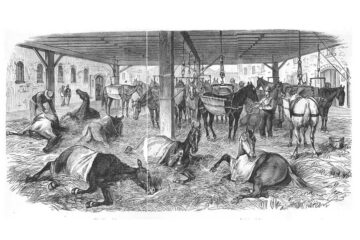Barbara Spindel in The Christian Science Monitor:
 Before the automobile, cities were powered by horses. These urban equines ferried passengers in streetcars and carriages; they pulled fire engines and ambulances. They delivered everything from milk and ice to mail. They hauled the coal for locomotive and steam engines.
Before the automobile, cities were powered by horses. These urban equines ferried passengers in streetcars and carriages; they pulled fire engines and ambulances. They delivered everything from milk and ice to mail. They hauled the coal for locomotive and steam engines.
As Bill Wasik and Monica Murphy explain in “Our Kindred Creatures: How Americans Came To Feel the Way They Do About Animals,” horses were often overworked – and brutally punished by their owners when they did not perform.
After being repelled by the violence of a bullfight in Spain in 1848, diplomat Henry Bergh was awakened to the suffering of animals; upon his return to the United States, he committed himself to advocating on their behalf. Bergh founded the nation’s first animal welfare organization, the American Society for the Prevention of Cruelty to Animals, in New York in 1866. He helped pass state anti-cruelty laws that gave him and his ASPCA agents enforcement powers, a role he relished. Top-hatted, tall, and with an aristocratic bearing, he patrolled the streets of New York, confronting the mostly working-class men he saw flogging their horses. “Can’t beat my own horse?” responded one driver incredulously when Bergh commanded him to stop. “You’re mad!”
More here.
